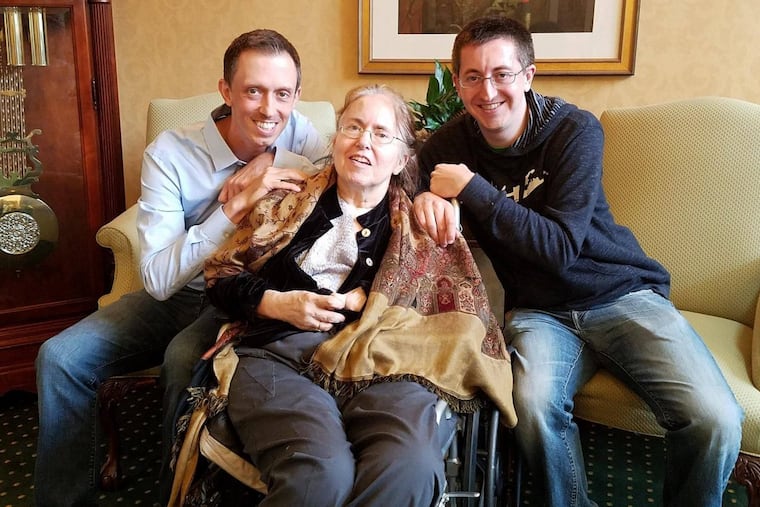As his mother's health fails, a son reflects on the gifts of her life
My mother, Marcia, suffers from Progressive Supranuclear Palsy (PSP) a little-known but devastating neurological disorder.

Last year at Christmas, I gave my mom a letter. I suspect it was the kind that every son spends a lifetime composing in his heart. I thanked her for years of unquestioning love, guardianship, and silent sacrifice. I reflected on the two great gifts she brought into the life she created: an abiding sense of humor that leavened the darkest days, and an unshakable faith in the dignity and promise of every human being.
I am profoundly lucky that in a world where so much between loved ones goes unexpressed, my note of thanks was written and delivered. And I'm grateful it reached my mom in time, before her illness takes control of her eyes.
My mother, Marcia, suffers from Progressive Supranuclear Palsy (PSP) a little-known but devastating neurological disorder. It took doctors years after we all knew something was wrong to make a proper diagnosis. PSP often rumbles ominously in the distance for years before the lightning strikes. When it does, it takes from its victims the ability to walk, and often, to use their hands. It slows cognition and effaces personality and self-control. In its final acts of cruelty, it can rob sufferers of the ability to recognize loved ones, to read, and to swallow.
My mom, born in York and raised in Haverford, spent her career as a social worker serving impoverished families first in Chester and then in Trenton. When money was tight, she worked nights in retail at a local Borders bookstore, and ate peanut butter and jelly sandwiches for dinner. She'd spend the year bargain hunting so that come holiday season, she could send presents to everyone in our family and transform her home into a festival of light and warmth. Now 68, she deserves a comfortable retirement that she will never get.
I often dream of my mom as she was before. She joins me on a simple walk down a leafy street, or chats effortlessly at a family gathering, or boogies with me to Mickey Mouse tunes, like we did when I was a little boy in Jenkintown. When I awake, I am confronted anew with all that I've lost.
Yet one afternoon, driving home after a particularly difficult visit, I realized that my mom's disease carries a silent gift within its many indignities.
For a moment, the horror of each "functional decline," as the doctors call it, unmasks the hidden miracle of what it has just spirited away.
We lose so profoundly from a loved one's illness because there is so much to take. Countless marvels abide, unremarked, in the simple act of human conversation. The sparkle of recognition and humor in our loved one's eyes. The vast and variegated landscape of shared memory and imagination we traverse together. The almost shocking vivaciousness of our minds in motion. The stuff of dreams.
Lately, my mom's affairs have stabilized. While her health continues to decline, she receives excellent care in an assisted living facility in New Jersey. The countless hours my brother and I have spent managing financial, legal, and medical issues have begun to taper. Our mom now has Medicaid, a flawed but essential program that has ensured her well-being and spared our family back-breaking costs. And since she can no longer walk, she can no longer fall.
Visits still carry the unspoken dread of wondering what unheralded trait will next flicker away. Yet they also convey a kind of peace. We stroke her hair and shower her with kisses. We know we have each said all that needs to be said. We never fight. Every memory matters. Every utterance is heard. The room is too small and the time is too tight to hold anything now, other than love.
Picking up a letter and reading it — another unremarked feat of human cognition and proprioception — is far harder for my mother now. Yet one year later, she still keeps my note by her bedside. And the strength of her personality still shines through the accumulated layers of disease. Last week, my brother and I covered her room in colored lights and fragrant garlands. Her eyes lit up like a child on Christmas morning.
David Wertime is Entrepreneur in Residence at the Lenfest Institute for Journalism in Philadelphia. For more information on PSP, visit psp.org.